Trading Day: ASX down as UK virus strain rattles markets
Stocks lose further ground as Covid fears fuel border closure worries, while Andrew Forrest could be in for a bumper $3.8bn payday.
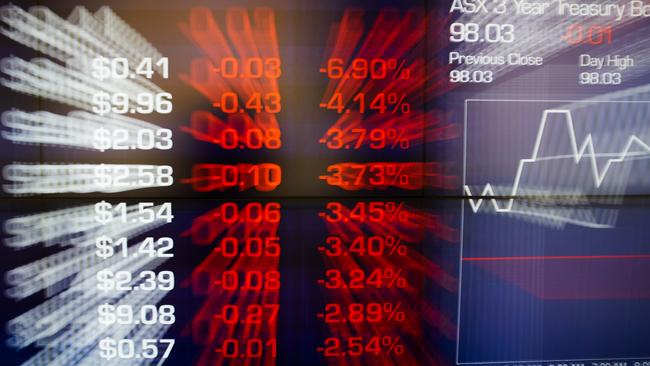
- Forrest set for huge dividend payout
- Magellan buys stake in Guzman y Gomez
- ACCC rejects Google offer on Fitbit
- Transurban poaches ANZ CFO Jablko
That’s all from the Trading Day blog for Tuesday, December 22. Australian stocks fell after a global sell-off that followed news of a fast-spreading strain of coronavirus emerging from England, prompting fresh travel restrictions. European stocks plunged and Wall Street was mostly lower, with the S&P 500 down 0.4 per cent, the Dow up 0.1 per cent and the Nasdaq slipping 0.1 per cent. Locally, retail sales figures were better than expected.
Damon Kitney 7.30pm: Judo Bank closes $280m capital raising
The Myer family and Bain Capital-backed Judo Bank has revealed it has secured more than $140m from new investors in its latest capital raising, valuing the challenger neobank for small- and medium-sized businesses at more than $1.6bn.
Judo Bank confirmed on Tuesday that had raised $280m in new equity, with 60 per cent of the raising coming from new major institutional investors, most of whom are believed to be offshore.
70 per cent of the bank’s largest current shareholders, which include the likes of Bain Capital Credit, Myer Family Investments, the Abu Dhabi Capital Group, Ironbridge, SPF Investment Management, OPTrust and Tikehau Capital, chose to resubscribe and increase their stakes in the issue.
4.30pm: ASX 200 down 1.1pc at close
The S&P/ASX 200 suffered a 1.1pc fall on Tuesday, losing 70.3 points, to close at 6599.60, a three-week low. Real estate and health indexes were the only sectors to gain by the end of the day’s session.
Energy was down 2.75pc and Materials and Utilities sectors lost around 2pc each.
Resources stocks Silver Lake Resources dropped 6.79pc and Ramelius Resources lost 5.97pc with other mining stocks also feeling the heat.
A2Milk was the biggest gainer, up 4.97pc, while the retail numbers spurred gains in shopping centre owners Scentre Group and Vicinity Centres.
The Australian dollar was 0.32pc weaker against the US dollar, trading around US75.63c by the close of the ASX session.
4.30pm: Omni Bridgeway shares hit after report
Listed class action funder Omni Bridgeway has responded to this week’s release of a final report into class actions. Omni Bridgeway shares were hit following the release of the report, with its shares off 4.3 per cent in late trade at $3.78.
A parliamentary joint committee’s report into litigation funding and regulation of class actions was tabled on Monday and made 31 recommendations, including legislative changes to court proceedings aimed at ensuring class action members had access to fair and equitable justice.
Among key proposals ligation funders would be forced to return a minimum of 70 per cent of proceeds from a case to class action participants.
Omni Bridgeway said it welcomes many recommendations as it would “raise the bar in a way that would require other industry participants to meet Omni Bridgeway’s high standards”.
On the issue of returns to class action members and litigation funder fees, Omni Bridgewayhad recommended that a statutory minimum of 50 per cent of gross proceeds be returned to class members but noted the committee recommended the Federal Government consult further on “whether a minimum gross return of 70 per cent to class members is the most appropriate floor”.
Omni Bridgeway says proposed changes to the continuous disclosure regime should be subject to “more general comment and public policy debate”.
Omni Bridgeway said it reiterates its longstanding belief in appropriate industry regulation, including licensing.
“Regulation offers important protection for consumers as well as benefits for the industry in terms of its credibility and standing”.
Patrick Commins 3.40pm: Tourism jobs number plunges
The number of tourism jobs has plunged by 113,000 this year, with more than one in seven Australians employed in the sector losing work over the course of the year as the twin horrors of the COVID-19 pandemic and Black Summer bushfires smashed domestic and international holiday travel.
The new figures from the Australian Bureau of Statistics confirmed tourism as one of the hardest hit segments of the economy in 2020, despite a 4 per cent lift in tourism and tourism-related jobs over the three months to September to 634,000 – the lowest level of employment since 2013.
The jobs recovery over the latest quarter followed six months of job shedding and as social distancing restrictions were eased around much of the country. But it still left tourism and tourism-related employment 15 per cent below the 747,100 employed at the end of 2019, and 13 per cent lower than the September quarter of last year.
Tourism looks to be once again one of the biggest losers from the reimposition of travel restrictions just ahead of the summer holidays.
Citi has estimated the closing of state borders to travellers from Sydney – after a new COVID-19 outbreak hit the city’s northern beaches – will shave $2bn a month from the tourism sector’s contribution to the national economy.
The recovery in tourism employment in the September quarter was a solely part-time phenomenon.
Full-time tourism jobs dropped by 18,300 over the quarter, or by 5.5 per cent, to 315,700, the ABS figures showed, while part-time roles jumped by 42,900, or 15.6 per cent, to 318,300. It was the first time that part-time jobs have outnumbered full-time roles in the 15-year history of the data, the ABS said.
The ABS tracked tourism-related employed persons and jobs across a range of industries, with the largest quarterly employment gains in cafes and restaurants, cultural services, and sports and recreational services, which all recorded double-digit percentage gains.
But air, water and other transport jobs plunged by a further 23 per cent in the quarter, to be the worst hit segment over the year to September, with 15,200, or 37 per cent, fewer jobs.
And despite the recent rebound, employment in cafes and restaurants was still 23,900, or 11 per cent, lower than 12 months earlier, while accommodation jobs were down by 23,500, or 26 per cent, year-on-year.
Elise Shaw 3.32pm: Sedgman extends Mount Pleasant mine contract
CIMIC Group’s minerals processing company, Sedgman, has been awarded an extended operations and maintenance services contract at the Mount Pleasant mine in NSW.
Sedgman will operate and maintain MACH Energy’s Mount Pleasant Coal Handling and Preparation facility for an additional three years. The extension will generate revenue of $120 million to Sedgman, bringing total revenue from the contract to $200 million.
CIMIC Group Executive Chairman and Chief Executive Officer Juan Santamaria said: “Sedgman and the CIMIC Group have a strong history with MACH Energy which we’re pleased to continue. Sedgman’s leadership in minerals processing will ensure maximum resource recovery for our long-term client.”
Sedgman Managing Director Grant Fraser said: “This contract is testament to the partnership we have forged with MACH Energy, and the integration of our engineering and operations capability.”
Sedgman completed the construction of this facility and have been operating the plant since 2019.
Elise Shaw 3.14pm: Record retail trade, but consumer confidence sinks: CommSec
Victorian virus “revenge spending”, the Apple iPhone 12 launch and blockbuster Black Friday sales were behind a massive surge in Aussie retail trade in November, notes commSec senior economist Ryan Felsman.
“Many Aussies now take advantage of late November Thanksgiving e-commerce and in-store sales to do their Christmas shopping. With the change in profile of retail spending, we may have seen another pull-forward of sales into November from the traditional December Christmas trading period.
“While the bumper November figures will be encouraging for retailers, the resurgence of new virus infection rates around Avalon on Sydney’s Northern Beaches will be of huge concern. Department stores and fashion outlets could see less foot traffic as consumers self-isolate across Greater Sydney.
“Consumer confidence has taken a knock nationwide as Covid-19 restrictions are re-imposed and state and territory borders are closed – ruining holiday and Christmas Day plans for many. But it is hoped that the Northern Beaches cluster can be contained and supressed due to the lockdown. The NSW government today reported that just eight new Covid-19 cases were detected in the 24 hours to 8pm last night with a record 44,466 tests conducted.
“A short and sharp lockdown - as seen in South Australia during November - could be effective in stopping the virus spread to Greater Sydney and beyond. The brief period of economic shutdown in South Australia saw a flat rather than huge decline in retail spending in November,” says Felsman.
“Of course, virus flare-ups will further accelerate the shift towards online spending on household goods, food and alcohol. The final retail trade numbers are due on January 11, 2021.”
Elise Shaw 2.31pm: Bumper November retail sales in ‘challenging’ year: ARA
Australian retail sales increased 13.2 per cent in November, compared to the same time last year, according to preliminary data released today by the Australian Bureau of Statistics (ABS).
Australian Retailers Association CEO Paul Zahra said it’s a fantastic result, off the back of Black Friday, Cyber Monday, and early Christmas shopping sales.
“Quite simply - November was an incredible month for Australian retailers,” Mr Zahra said.
“Black Friday, Cyber Monday and early Christmas shopping sales were just what the doctor ordered after what’s been a very challenging year.
“Household goods led the way, with a monthly increase of 13 percent, and it’s also pleasing to see healthy increases in sales of clothing, footwear and personal accessories as these areas were some of the hardest hit by the COVID pandemic.
“The preliminary ABS figures released today back up what Australia Post has reported for November – a massive 55.6 percent year on year increase in online purchases. This shows Australia has well and truly embraced the global Black Friday and Cyber Monday shopping tradition.
“While the figures are very encouraging, we are remaining cautious.
“The COVID-19 cluster on the Northern Beaches is having an impact on NSW retailers and we’re seeing reduced foot traffic at stores across Sydney, during what should be their busiest time of year.
“NSW retailers have strengthened their COVID safety protocols and we support them in their efforts to keep their businesses open and to keep their staff and shoppers safe.”
READ MORE: Victorian shoppping spree supercharges retail trade in November
1.16pm: House passes US coronavirus relief package
The US House of Representatives has passed a sweeping year-end package that included roughly $US900 billion of relief for households and businesses battered by the coronavirus pandemic, an emergency measure aimed at buoying the country through a difficult winter.
In two votes, the House approved both the infusion of coronavirus aid and a $US1.4 trillion full-year spending bill that will fund the government through next September. The vote for the coronavirus relief package was 359-53.
Under the deal reached yesterday (AEDT), Congress is expected to approve another round of direct checks of $US600 per adult and $US600 per child, add $US300 to weekly unemployment payments for 11 weeks and extend two other unemployment programs, supply more than $US300 billion in relief for small businesses, including a second round of the Paycheck Protection Program, and pour more than $US50 billion into distributing coronavirus vaccines, as well as testing and tracing efforts.
The bill heads now to the Senate, where lawmakers said it would pass with strong bipartisan support. President Trump is expected to later sign the bill into law.
Dow Jones Newswires
1.02pm: Banducci offloads $2m in Woolworths shares
Woolworths chief executive Brad Banducci has sold a parcel of shares in the company worth near $2m, to fund expected personal tax obligations.
The sale of 50,000 shares for $1,999,500 was executed at $39.99 per share. That is below the stock’s February peaks of more than $43 but sharply up from prices near $34 seen as the COVID-19 pandemic hit in May.
Mr Banducci retains 332,643 shares in the group, well above his minimum shareholding requirement of 200 per cent of total fixed remuneration.
The chief executive’s total pay for the 2020 financial year, including short and long-term incentives, was $9.45m.
Woolworths shares last traded at $39.25, down 1.6 per cent.
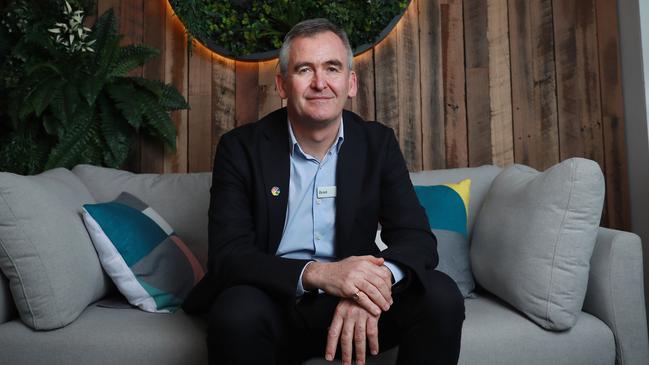
Perry Williams 12.53pm: Orica feels heat of China coal ban
Explosives manufacturer Orica has been forced to slash supplies of ammonium nitrate to Australian coal miners, as China’s ban continues to roil the industry.
Fears are growing that China’s blacklisting of Australian coal may force mines in Queensland and NSW to shut, with Beijing’s move crippling revenues from the nation‘s second biggest export industry.
“We are very concerned that all Australian exports of thermal and metallurgical coal to China are currently stopped,” Orica chief executive Alberto Calderon said at its annual general meeting on Tuesday.
“We hope that the government can quickly re-establish constructive dialogue, build understanding of the issues on both sides and begin the process of normalising relations.”
Half of Australia’s mines depend on Orica to keep their production running through its supply of bulk explosives and detonator systems and Mr Calderon said the company has already suffered from the ban.
“At this stage for the next month we are anticipating about a 10,000 tonne impact on the east coast of ammonium nitrate demand per month. So every month that it’s not sold, it’s going to be about 10,000 tonnes. So that’s why we are urging the government to do what it can to normalise this situation.”
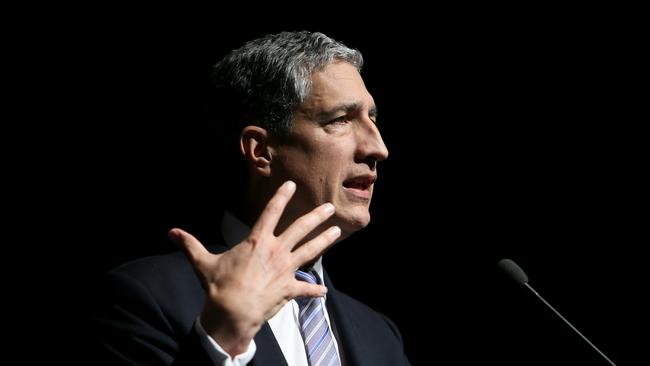
Orica chairman Malcolm Broomhead, also a BHP director, said it was difficult to forecast how the coal standoff would be resolved.
“We’ve seen impacts continue into the start of this financial year and given the constantly evolving situation it’s difficult to predict at this point the extent of that impact. But we’re continuing to closely monitor the situation and are regularly maintaining communication with our customers.”
The Orica chairman is hopeful the Biden administration will reset Washington’s relationship with China, allowing Australia to also mend tensions.
Mr Broomhead said he hopes the incoming Biden administration “will act as a circuit breaker, and lead to a rebalancing of international relations, particularly with China, that Australia can then leverage.”
12.15pm: ASX losses deepen at noon
Australian stocks sank further in late morning trade, amid global worries about a new Covid strain in the UK, and a hit to Australian confidence.
After opening down around 0.5 per cent, the benchmark S&P/ASX 200 Index slid further in morning trade to be down 0.95 per cent to 6606.80 points by midday, amid volatile trade.
This was despite better than expected retail trade figures, and relief over a relatively small increase in new numbers in the Sydney COVID outbreak.
The energy sector was a drag on the market, after Brent crude sank 3.5 per cent overnight to
$US50.41 a barrel.
Tokyo stocks also opened lower following a mixed close on Wall Street as coronavirus worries intensified.
The Nikkei 225 index was down 0.47 percent or 124.63 points at 26,589.79 in early trade, while the broader Topix index was down 0.73 percent or 13.03 points at 1,776.02.
“Japanese shares are seen dominated by sell orders on concerns over expansion in coronavirus infections at home and abroad, even though expectations for US stimulus is supporting the downside,” Mizuho Securities said in a commentary
Perry Williams 12.06pm: Forrest set for huge dividend payout
Fortescue Metals Group founder Andrew Forrest could pocket a bumper $3.8bn payday in 2021 if iron ore prices remain trading near decade highs.
The West Australian miner, 36 per cent owned by Mr Forrest, may make an overall dividend payment to investors of $3.40 per share for the 2021 financial year, according to UBS forecasts.
That would net the billionaire $3.8bn in total dividends based on his current shareholding, nearly double the $1.96bn cheque he received this year.
The $3.40 a share windfall assumes an interim dividend of $1.40 a share and a final payout of $2 a share on a 80 per cent payout ratio, at the top end of its dividend payout range.
The calculations are based on iron ore averaging its current price of $US176 a tonne for the first six months of the 2021 financial year and assumes Fortescue sells 85 per cent of its ore at that price along with the US dollar at 76c.
UBS rates Fortescue a buy and lifted its price target on Tuesday to $24 a share from $22 previously.
Fortescue overtook Westpac as Australia’s sixth most valuable company on Monday after iron ore prices surged near decade-highs on rampant Chinese demand.
A 50 per cent price jump has propelled iron ore to $US177 a tonne, not far from the all-time record of $US191 a tonne achieved in February 2011.
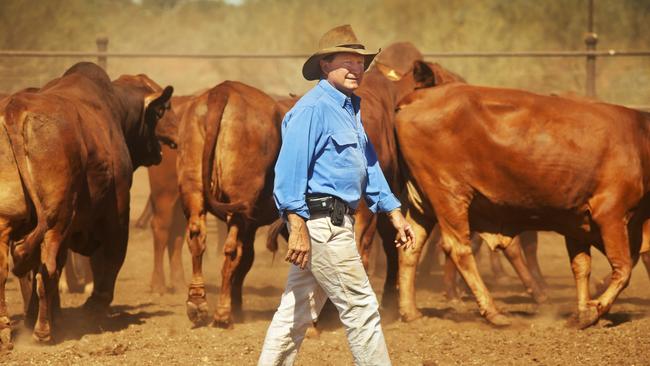
Lilly Vitorovich 11.33am: Hipages given a ‘buy’ rating
Goldman Sachs has initiated coverage on on-demand tradie platform hipages with a buy rating and 12 month target price of $2.90, implying 36 per cent upside.
Broker says its investment case is driven by eight key factors, including a large pool of home improvements spending and tradies, increasing allocation of spend to digital advertising and solid trading update to October.
For FY21, Goldman Sachs forecasts recurring revenue growth of 20+ per cent and total revenue growth of 15+ per cent in line with hipages’ recent prospectus.
However, the broker notes hipages provided a trading update on November 12, in which the group indicated 1Q21 total revenue growth was running at 17+ per cent and recurring revenue growth at 24 per cent, with these growth rates continuing into October.
Hipages listed on the ASX last month, with its largest shareholder News Corp, publisher of The Australian, owning about 25 per cent. Other key shareholders include Right Click Capital and Ellerston Capital.
Hipages shares are up 6.6 per cent to $2.36 on the ASX late morning Tuesday.
11.37am: Retail sales soar in November
Australian retail sales jumped by 7.0 per cent, month-on-month, in November, seasonally adjusted, according to preliminary data from the ABS, smashing expectations as consumers opened their wallets ahead of Christmas.
The rise was 13.2 per cent annually, seasonally adjusted.
Consensus estimates had been for a rise of 2.0 per cent, sharply up from October’s 1.4 per cent rise in seasonally adjusted sales.
Jess Malcolm 11.04am: NSW records just eight new cases
Premier Gladys Berejiklian says NSW has recorded eight new cases of COVID-19, with seven cases linked to the Avalon cluster and the eighth in hotel quarantine.
Following a testing record of 45,000 carried out yesterday, the NSW Premier flagged concern that even though case numbers are low, the number of venues are rapidly growing each day meaning the risk of transmission across Sydney is still high.
“When you have people with the virus who have attended venues outside of the northern beaches community, it always increases our concern to make sure there isn’t a permanent seeding event created by any of those venues,” Ms Berejiklian said on Tuesday morning.
Chief Health Officer Dr Kerry Chant said the eighth case which is still under investigation is a healthcare worker from Western Sydney who was involved in the transfer of patients from the international airport.
“We are obviously doing urgent genome sequencing to confirm that that is the source of their infection and those results will be available later today,” said CHO Kerry Chant
11.04am: Washington Post to open Australian bureau
The Washington Post will open a Sydney bureau in 2021, as it expands its offshore footprint in Europe and Asia.
Like The New York Times, the Post’s Sydney office will be staffed by a bureau chief alone.
The group will also open new offices in London and in Seoul, and a one-person bureau in Bogota, during the year
10.46am: MGM Holdings explores sale
MGM Holdings, the movie studio behind the “James Bond” franchise, is exploring a sale, according to people familiar with the matter, betting that its library of content will prove attractive to companies pursuing growth in streaming video.
Closely held MGM has tapped investment banks Morgan Stanley and LionTree LLC and begun a formal sale process, the people said. The company has a market value of around $US5.5 billion, based on privately traded shares and including debt, some of the people said.
The studio has contemplated a sale at various points over the past few years, but potential suitors have previously baulked at the price MGM was seeking. MGM is hopeful the current process will generate interest beyond Hollywood’s traditional players, from international media companies, private-equity investors and blank-check companies, one of the people familiar with the matter said.
MGM’s biggest shareholder, New York hedge fund Anchorage Capital Group, has come under pressure in recent years from weak performance and defecting clients, and its illiquid investment in MGM has become a larger percentage of its hedge fund as it shrinks.
MGM’s exploration of a possible sale comes amid a bidding war for content to fill a new wave of streaming-video services. MGM’s library of titles could make it an attractive target, its investors say.

Dow Jones
10.30am: Charter Hall funds to buy David Jones store
A consortium of Charter Hall Group managed funds and partnerships will buy the flagship David Jones store in central Sydney for $510 million.
Charter Hall Long WALE REIT will own 50pc of the asset, with Charter Hall Group and the Charter Hall DVP partnership splitting the remaining 50pc interest. The property was acquired on a sale-and-leaseback basis with David Jones.
“The purchase price reflects a 5pc initial yield based on the initial annual net rent of $25.5 million, reflecting approximately $800/square metre of lettable area,” Charter Hall said in a statement to the Australian Securities Exchange.
Charter Hall chief executive David Harrison said the transaction will help to increase the group’s funds under management above $45 billion as at the end of December.
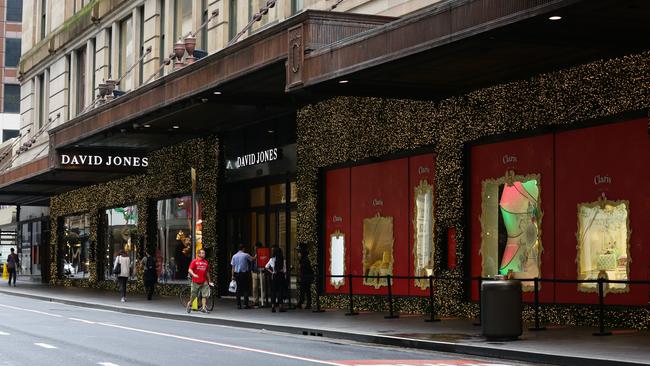
Dow Jones Newswires
10.12am: ASX slides as Covid hits confidence, global markets
Australian shares have opened weaker, pulling back 0.5 per cent, following a choppy night on global markets as investors were unsettled over a new COVID strain emerging in the UK.
At the same time consumer confidence has slipped in Australia following the outbreak of the coronavirus in Sydney’s northern beaches.
The benchmark S&P/ASX 200 Index opened down 35 points, or 0.5 per cent at 6634 points. The SPI 200 futures index had pointed to a drop of 0.4 per cent on opening.
ASX-listed UK-based Virgin Money was the biggest faller on opening, down 6.7 per cent, while tech play WiseTech global was down 6.6 per cent.
Earlier the ANZ-Roy Morgan sentiment survey conducted over the weekend shows a 2 per cent drop in confidence, led by a sharp 5.3 per cent fall in Sydney - its steepest decrease since July.
The only other week confidence has dropped in over four months coincided with Adelaide’s short lockdown in November to suppress an outbreak in the South Australian capital.
Elsewhere Woolworths said it was imposing buying limits on toilet paper and paper towels at around 200 of its supermarkets in the Greater Sydney area to prevent panic buying in the wake of the COVID-19 outbreak in the city’s northern beaches.
Overnight London’s FTSE index fell 1.7 per cent, while Wall Street clawed back the most of losses that had seen it down as much as 2 per cent during the session. The Wall Street benchmark S&P 500 ended down 0.4 per cent. Meanwhile the tech-heavy Nasdaq fell 0.1 per cent.
The S&P/ASX 200 on Monday closed 5.6 points lower at 6669.9, a decline of 0.1 per cent.
Over the last five days, the ASX/S&P 200 has gained +0.5 per cent, but is virtually unchanged over the last year to date.
Perry Williams 9.50am: Kilsby quits BHP board after two months
BHP board member Susan Kilsby will relinquish her job as the mining giant’s senior independent director after just two months in the role.
Ms Kilsby was appointed senior independent director on October 15 after the retirement of Shriti Vadera and was also chair of BHP’s remuneration committee.
The US investment banker - who also holds board roles at Unilever and Diageo - will leave BHP’s board no later than its next annual general meeting in October after deciding to chair Fortune Brands Home & Security, where she is already a director.
BHP director Gary Goldberg has been named as its new senior independent director, effective immediately, with Christine O’Reilly to chair its remuneration committee from March 1, 2021.
Eli Greenblat 9.52am: Woolies brings back toilet paper limits
Woolworths is imposing buying limits at around 200 of its supermarkets in the greater Sydney area to prevent panic buying in the wake of the COVID-19 outbreak in the city’s northern beaches.
Woolworths announced it has today reinstated a two-pack purchase limit both in-store and online for toilet paper and paper towels across greater Sydney.
It said the precautionary move follows an increase in demand for toilet paper in pockets of Sydney and will help ensure Woolworths customers have fair access to these products over the Christmas period.
Woolworths said it has tripled toilet paper order volumes in NSW and is set to deliver more than 400,000 packs into its NSW stores this week.
Woolworths Supermarkets New South Wales general manager, Michael Mackenzie said: “We’ve continued to see a steady increase in demand for toilet paper across different parts of Sydney in the past 24 hours. While demand is nowhere near the levels we saw earlier this year, we’re taking a preventative step ahead of the busy pre-Christmas trade.”
Coles is expected to soon follow with its own buying limits.
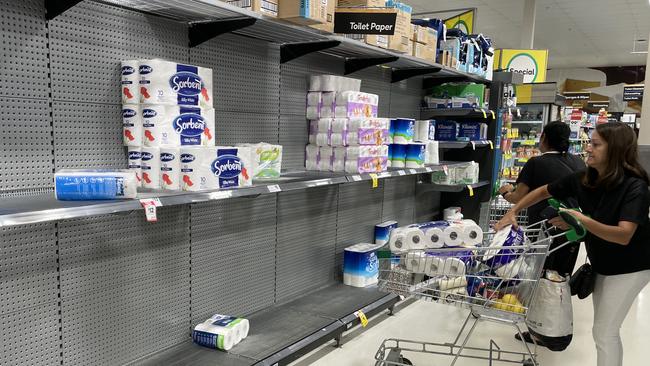
Patrick Commins 9.49am: Virus outbreak hits confidence
Sydney’s northern beaches coronavirus outbreak has sent consumer confidence tumbling for only the second time in 16 weeks.
The ANZ-Roy Morgan sentiment survey conducted over the weekend shows a 2 per cent drop in confidence, led by a sharp 5.3 per cent fall in Sydney - its steepest decrease since July.
The only other week confidence has dropped in over four months coincided with Adelaide’s short lockdown in November to suppress an outbreak in the South Australian capital.
A stream of negative headlines has had an effect on confidence outside NSW, even before the reimposition of border controls.
Confidence weakened in Victoria - down 2.9 - per cent, while sentiment also worsened in Queensland and the Northern Territory, the ANZ report said.
9.40am: Wall Street cheers US banks move
Bank stocks have reason to pop the champagne before New Year’s Eve.
Shares of the sector soared on an otherwise down day for Wall Street as investors cheered the Federal Reserve’s move to allow the nation’s largest banks to resume share repurchases, subject to limitations.
The SPDR S&P Bank ETF was up 0.7 per cent, while shares of JPMorgan Chase and Bank of America gained 3.8 per cent and 3.7 per cent, respectively.
Soon after the Fed’s announcement Friday, JPMorgan announced plans to repurchase $US30 billion worth of shares in 2021. Morgan Stanley also announced plans to buy up to $US10 billion worth of shares.
Few on Wall Street expected the central bank to allow buybacks so soon. With rising coronavirus cases across the country and the spectre of continued shutdowns, there remains much uncertainty about the path of the economic recovery.
But after facing their second stress test of the year, banks were able to prove that they are equipped to handle an economic downturn even worse than what many economists had forecast. In drawing up the stress test scenarios earlier this year, the Fed noted they were “significantly more severe than most current baseline projections for the path of the U.S. economy.”
Dow Jones
Bridget Carter 9.33am: TPG buys Funlab
Private equity firm TPG Capital has agreed to buy Funlab from Next Capital for $250 million.
The deal comes after Funlab is understood to have staged a strong recovery from trading disruptions this year linked to COVID-19.
Funlab owns Strike Bowling bars, Sky Zone indoor trampoline parks and Holy Moley mini-golf and last was in the crosshairs of rival private equity firm Pacific Equity Partners.
Funlab also contemplated a float through Citi and JPMorgan in 2019 for a similar price and was at that time expected to generate a 26 per cent lift in sales for the 2020 financial year, according to analysts from investment bank Citi.
Funlab also expected its annual earnings before interest, tax, depreciation and amortisation to increase by 62 per cent to $29m before the COVID-19 pandemic hit.
Funlab operates various entertainment concepts across Australia, New Zealand and Singapore.
9.12am: ACCC rejects Google offer on Fitbit takeover
The competition watchdog says it will not accept a long-term behavioural undertaking offered by Google that sought to address ACCC concerns about its proposed acquisition of wearables supplier and manufacturer Fitbit.
The ACCC will therefore continue its investigation into the takeover and has set a new decision date of March 25, 2021.
“The ACCC continues to have concerns that Google’s acquisition of Fitbit may result in Fitbit’s rivals, other than Apple, being squeezed out of the wearables market, as they are reliant on Google’s Android system and other Google services to make their devices work effectively,” ACCC Chair Rod Sims said.
The proposed acquisition also further consolidates Google’s leading position in relation to collecting user data, which supports its market power in online advertising.
“We are also continuing to investigate the acquisition’s potential impact on wearable operating systems,” Mr Sims said. “The acquisition may result in Google becoming the default provider of wearable operating systems for non-Apple devices and give it the ability to be a gatekeeper for wearables data, similar to the position it holds for smartphones which licence the Android operating system.”
Google had sought to address ACCC by offering a court enforceable undertaking that it would behave in certain ways towards rival wearable manufacturers, not use health data for advertising and, in some circumstances, allow competing businesses access to health and fitness data.

Eli Greenblat 8.54am: Asaleo buys TOM Organic
Asaleo Care, currently the target of a takeover bid from its biggest shareholder, Swedish consumer goods giant Essity, will pay $12.75 million for the TOM Organic business, which sells a range of feminine hygiene products.
The acquisition further extends Asaleo Care’s product and service portfolio into higher growth, higher margin categories, it said.
The transaction is expected to be immediately accretive, with anticipated first year net revenue to exceed $11m and underlying EBIT expected to be $1.7m. Those earnings are expected to increase to $3.5m-$4m in the second year.
This month Essity launched a bid for Asaleo priced at $1.26 per share to increase its stake in the company to above 36.6 per cent.
8.50am: Transurban poaches ANZ CFO Jablko
Transurban has hired Michelle Jablko from ANZ as its new chief financial officer.
Ms Jabklo, ANZ’s finance boss since 2016, will join the toll road giant in early 2021 and will be based in Melbourne.
She replaces Adam Watson, who left Transurban for gas pipeline operator APA Group.
Ms Jablko previously worked as an investment banker with UBS and Greenhill Australia.
“We are delighted that Michelle will be joining Transurban Group and I believe that with her leadership, capabilities and experience she will make a significant contribution to the Transurban business,” Transurban chief executive Scott Charlton said.
ANZ said it will conduct an internal and external search for her replacement. Internal audit boss Shane Buggle has been named interim CFO.
Ms Jablko, who joined ANZ as CFO in 2016 after a 15-year career in investment banking, said: “It was an incredibly tough decision to leave ANZ, however I am looking forward to putting my experiences to use in another industry… I’m particularly proud of the work we have done to strengthen and simplify the bank as well as the highly capable finance function we have built over the last few years.”
ANZ chief executive Shayne Elliott said: “Michelle can be incredibly proud of all she has achieved at ANZ. As a highly strategic CFO, she has transformed our finance function while also being instrumental in the simplification and strengthening of the organisation.”
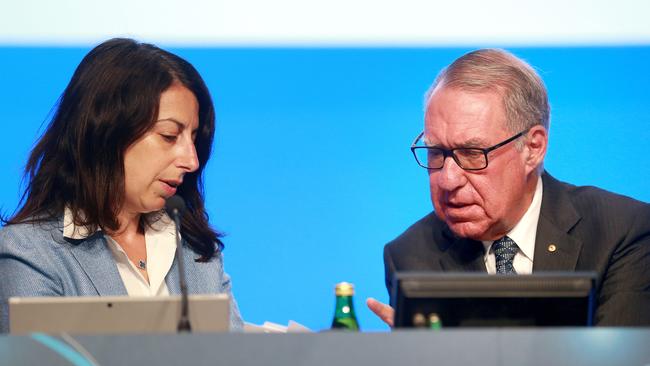
8.40am: Ramsay extends NHS agreement
Ramsay Health Care says it has signed a new volume-based agreement with NHS England, making its services available to Britain’s health service as it deals with the COVID-19 pandemic.
Under the deal, which replaces an existing agreement, Ramsay will be able to continue providing private patient activity.
8.20am: Magellan buys stake in Guzman y Gomez
Magellan chairman Hamish Douglass on Tuesday announced the first investment for Magellan’s Principal Investments arm outside the financial services sector: a shareholding in fast growing burritos and tacos chain Guzman y Gomez (GYG).
Mr Douglass said Magellan was utilising its long-held expertise in the quick services restaurants space with the $86.8 million investment for a 10 per cent stake in GYG. The investment puts an enterprise value on GYG of over $800 million
The move by Mr Douglass is a nod to world’s most revered investor Warren Buffett who famously said he was a better investor by being a business owner.
As well as investing in top stocks, over the decades his Berkshire Hathaway group has taken a range of minority positions in companies across the insurance, railroads, manufacturing, utilities and logistics sectors.
Magellan has made more than seven times its money on its investment in Yum Brands. which owns KFC, Pizza Hut and Taco Bell. Its position in global fast food giant McDonalds has also returned multiples on Magellan’s initial investment.
8.25am: Stocks to open lower
Australian stocks are set to slip at the open following a global market sell-off, prompted by news of a fast-spreading strain of coronavirus emerging from England.
At about 8am (AEDT) the SPI futures index was down 24 points, or 0.4 per cent.
Yesterday, Australian stocks closed steady following the return of border restrictions because of Sydney’s COVID-19 outbreak.
The Australian dollar was lower at US75.92c.
Futures on Brent crude, the international energy benchmark, lost 2.6 per cent to $US50.91 a barrel.
The Tianjin iron ore price surged $US12.75 or 7.8 per cent to a nine-year high of $US176.90 a tonne due to a supply outage at Vale’s Brumadinho mine in Brazil, CommSec reported.
8.05am: Wall Street ends mostly lower
The S&P 500 fell as a rapidly spreading strain of coronavirus emerging from England prompted fresh travel restrictions, a setback for the global economic recovery.
The broad-based index closed lower by 0.4 per cent. The Dow Jones Industrial Average ticked up 0.1 per cent, having bounced back from a midmorning loss of more than 420 points, or about 1.4 per cent.
The technology-heavy Nasdaq Composite slipped 0.1 per cent. All three indexes were trading at records last week.
Overseas, European shares tumbled after countries across the Continent and beyond barred travelers from Britain in an effort to keep out an infectious variant of coronavirus that is spreading rapidly in England. The pan-continental Stoxx Europe 600 slumped 2.3 per cent.
“People are bracing themselves for a challenging start to 2021,” said Brian O’Reilly, head of market strategy for Mediolanum International Funds.
Oil prices also retreated amid expectations that fresh restrictions on European travel and transport will pinch fuel demand heading into 2021. Futures on Brent crude, the international energy benchmark, lost 2.6 per cent to settle at $US50.91 a barrel, their largest one-day drop in six weeks.
A big support for the market was the prospect of a fiscal relief package that will ease pressure on the American economy. Congress was set to vote Monday on the roughly $US900 billion aid package, after Republicans and Democrats reached a deal late Sunday. The legislation -- which includes direct checks to many Americans, additional unemployment benefits and relief for small businesses -- could help support consumption in the coming months.
“It is more an antidepressant than a stimulant,” said Paul Donovan, chief economist at UBS Global Wealth Management. “The uncertainty here is to what extent are the $600 checks spent, and to what extent does an extra $US300 a week unemployment benefit mitigate fear of unemployment for those who have jobs.”
Financials got a boost after the Federal Reserve said late Friday afternoon that it would allow banks to resume share buybacks. Goldman Sachs shares rallied 7 per cent, making it the best performer in the Dow.
Nike shares jumped 4.8 per cent after the sportswear giant said late Friday that digital revenue for its flagship brand rose 84 per cent in the three months through November.
Oil producers, airlines and cruise-line operators were all hit by the resurgence of coronavirus fears. Exxon Mobil shed 1.9 per cent. American Airlines Group dropped 2.3 per cent, while Carnival slid 1.3 per cent.
In European markets, London-listed shares of Royal Dutch Shell fell 5 per cent after the oil major said it would write down the value of its assets by up to $US4.5 billion.
The U.K.’s benchmark FTSE 100 slid 1.7 per cent. Officials over the weekend tightened lockdown measures on London and surrounding areas in an effort to contain the new strain of virus, which appeared to be spreading 70 per cent faster than earlier variants, according to the British government.
Adding to investors’ concerns about U.K. markets, negotiators missed a Sunday deadline for reaching a Brexit agreement, raising the prospect of a disruptive U.K. exit from the European Union at the end of the year. The pound dropped 0.4 per cent against the dollar.
Dow Jones Newswires
7.40am: Joe Biden receives the coronavirus vaccine
President-elect Joe Biden received the Covid-19 vaccine in a televised appearance from a Delaware hospital in which he encouraged the public to get vaccinated. “There’s nothing to worry about,” he said.
Mr Biden received the first of two doses after top public health officials recommended that he be fully vaccinated before his January 20 inauguration. He was joined by his wife, Jill Biden, who received the first course of the vaccine earlier in the day, his transition team said.
“We owe these folks an awful lot,” Mr. Biden said of the medical professionals at ChristianaCare Hospital in Newark, Del.
The president-elect’s inoculation came a week after the start of the first U.S. Covid-19 vaccinations, the most significant mass-immunization campaign since the 1950s.
Vice President-elect Kamala Harris is scheduled to be vaccinated next week in preparation for the new administration.
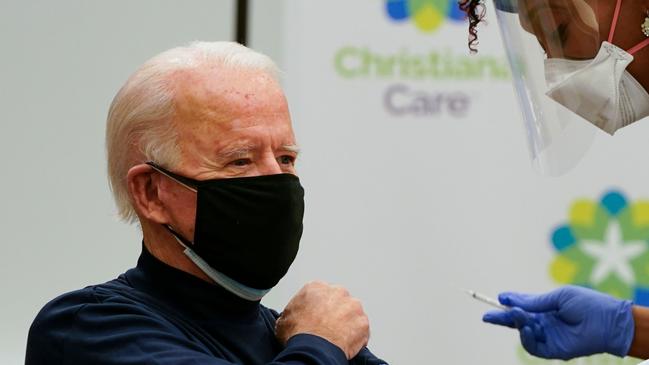
Dow Jones Newswires
6.20am: US stocks pare losses, oil tumbles
The S&P 500 fell as a fast-spreading strain of coronavirus emerging from England prompted fresh travel restrictions, dealing a blow to prospects for the global economic recovery.
The broadbased index was down 0.4 per cent in early-afternoon trading. The Dow Jones Industrial Average ticked up 0.2 per cent, having bounced back from a midmorning loss of more than 420 points.
The technology-heavy Nasdaq Composite slipped 0.2 per cent. All three indexes were trading at records last week.
Overseas, European shares tumbled after countries across the continent and beyond barred travellers from Britain in an effort to keep out an infectious variant of coronavirus that is spreading rapidly in England. The pan-continental Stoxx Europe 600 slumped 2.3 per cent.
“People are bracing themselves for a challenging start to 2021,” said Brian O’Reilly, head of market strategy for Mediolanum International Funds.
Oil prices also retreated amid expectations that fresh restrictions on European travel and transport will pinch fuel demand heading into 2021. Futures on Brent crude, the international energy benchmark, lost 3.5 per cent to $US50.45 a barrel.
Still, some investors took advantage of Monday’s declines to buy stocks, lifting the market off its session lows.
“To me, it’s a buying opportunity,” said Philip Blancato, president of Ladenburg Thalmann Asset Management. In recent weeks, his firm has bought bank and industrial stocks in expectation that the economy will stabilise early next year, boosted by progress in vaccinations.
“You could have as many as 20 million Americans inoculated by the first week of January. As those numbers increase, it’s going to have a profound effect,” Mr. Blancato added.
A big support for the market was an agreement struck by lawmakers on a fiscal relief package that will ease pressure on the American economy. Congress was set to vote today on the roughly $US900 billion aid package, after Republicans and Democrats reached a deal late Sunday. The legislation--which includes direct checks to many Americans, additional unemployment benefits and relief for small businesses--could help support consumption in the coming months.
Overseas, London-listed shares of Royal Dutch Shell fell 5 per cent after the oil major said it would write down the value of its assets by up to $US4.5 billion.
Asian markets were mixed. China’s Shanghai Composite Index gained 0.8 per cent, while Hong Kong’s Hang Seng fell 0.7 per cent. In Japan, the Nikkei 225 slipped 0.2 per cent.
Dow Jones Newswires
6.12am: Tesla shares slide on S&P 500 debut
Shares of Tesla declined in their S&P 500 debut Monday as the massive wave of demand that had propelled the stock ahead of its inclusion subsided.
The electric-car maker’s shares slumped 5.1 per cent in morning trading, suggesting some investors were cashing out following Tesla’s addition to the S&P 500. The declines in Tesla, the sixth-largest company in the market-cap-weighted index, contributed less than one-tenth of a percentage point to the S&P 500’s 1.2 per cent slide.
The swoon also coincided with broader stock-index declines as investors grew jittery about worsening coronavirus cases in the U.K and stricter lockdown measures. The worsening cases served as a wake-up call to many after enthusiasm about coronavirus vaccinations has pushed stocks to records in recent weeks.
For Tesla investors, Monday’s slide was a small dent in what has been an otherwise blockbuster year of gains. Shares of the Palo Alto, Calif., company are up 687 per cent this year and set a record Friday, creating scores of millionaires who had bet heavily on the company and its charismatic and sometimes controversial chief executive, Elon Musk. A significant chunk of those gains came after S&P Dow Jones Indices last month said it would add Tesla to the benchmark, with Tesla rising nearly 6 per cent on Friday alone.
Dow Jones
6.10am: Gold settles lower
Gold prices finish modestly lower, knocked down as the dollar staged a mini-rebound amid growing concerns about a possible variant of the novel strain of coronavirus that causes COVID-19.
Worries about increased lockdown procedures in London and parts of Europe drove investors to the perceived safety of dollars and compelled some traders to momentarily sell some of their bullion holdings, experts said.
Gold for February delivery closed off $US6.10, or 0.3pc, to settle at $US1,882.80 an ounce,
Dow Jones
6.05am: US Congress set to approve $US900bn stimulus package
US lawmakers are today set to vote on a $US900 billion relief package to help millions of families and small businesses struggling amid the pandemic.
As the COVID-19 death count rises amid a massive resurgence of the virus that again threatens the economy, Republican and Democratic legislators finally agreed on the plan late Sunday after months of wrangling and bitter debate over what to include.
The deal will spare millions of jobless workers who were days away from seeing their unemployment benefits expire, and provide a new round of cash payouts to Americans.
Small businesses will benefit from more government grants, while the package also includes rental assistance to families facing eviction.
AFP
6.00am: European markets plunge on new virus strain
European stocks, oil prices and the pound slumped as a highly infectious strain of coronavirus in Britain had traders seeking shelter.
Sterling lost 1.3 per cent against the dollar, with the pound also still being hit as a post-Brexit trade deal between Britain and the EU remained out of reach.
The euro gained 1.0 per cent against the pound, while oil prices slipped by more than 4.0 per cent.
“The short-term crude demand outlook just got dealt a massive blow that will provide added uncertainty over the next couple of months,” remarked Edward Moya, a senior analyst with the online broker Oanda.
London’s benchmark FTSE 100 index was 1.7 per cent lower at the end of the day, while in midday New York trades, the Dow Jones index was off by 0.3 per cent.
Frankfurt lost 2.8 per cent and Paris fell 2.4 per cent.
British Prime Minister Boris Johnson chaired a crisis meeting as a growing number of countries blocked flights from Britain over a new coronavirus strain that the UK said was “out of control”.
It overshadowed positive news from Washington, where US lawmakers reached a deal for a nearly $US900 billion COVID-19 financial rescue package to help struggling Americans.
“The US got its stimulus package through but it seems that was largely priced in and investors are more concerned with the new strain of COVID-19,” Oanda analyst Craig Erlam told AFP.
“Coming at a time when another Brexit deadline has been missed... it’s no surprise to see sentiment taking a big hit.” The US announcement came as a relief to markets desperate for Washington to give the world’s top economy a much-needed boost as it struggles with the impact of COVID-19.
At the weekend, US authorities also gave the green light to another vaccine produced by Moderna, paving the way for it to be rolled out this week.
A post-Brexit trade deal meanwhile seemed no closer, with UK-EU talks edging ahead after missing another deadline, overshadowed by the transport chaos caused by the new virus variant.
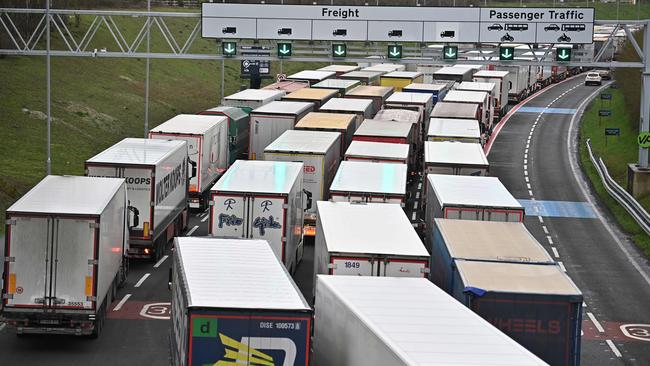
AFP
5.50am: Brexit talks flirt with failure
EU and UK trade talks inched onwards under renewed pressure as transport chaos triggered by the emergence of a more contagious variant of the coronavirus in Britain complicated efforts to reach a Brexit deal.
Only 10 days are left until January 1 when Britain will leave the EU single market and customs union and hopes of securing a new arrangement suffered a blow as another deadline went by.
EU and British negotiators remained in Brussels, with talks still blocked over the right of European crew to continue fishing in Britain’s rich waters, as well as concerns over fair trade rules.
Without a deal, Britain’s links to the European Union end at midnight on December 31 (11pm UK time) with a new tariff barrier that will sharpen the big shock of unravelling a half-century of EU membership.
A Sunday deadline set by the European parliament, which could refuse to approve the agreement, passed without an agreement being found, leaving no time for MEPs to ratify an eventual deal before January 1.
AFP
5.45am: EU approves Fiat Chrysler and PSA merger
The European Union has given conditional approval to the mega-merger of car giants Fiat Chrysler (FCA) and Peugeot Citroen (PSA), after the firms agreed commitments to overcome competition fears.
“The approval is conditional on full compliance with a commitments package offered by the companies,” the European Commission said, in a statement.
The tie-up, which was announced late last year and planned to be completed in early 2021, will create Stellantis, set to be the world’s fourth-largest automaker in terms of volume, and number three in terms of sales.
The combined company unites brands such as Peugeot, Citroen, Fiat, Chrysler, Jeep, Alfa Romeo and Maserati into a global giant, each of which will continue under its own marque.
The European Commission said the decision to approve the deal came after it had carried out an “in-depth investigation” over concerns it might stifle competition.
Brussels was worried the merger could effect Europe’s highly-profitable market for vans, which are technically easy to manufacture but sell at good prices.
To assuage those concerns, the commission said PSA would continue an agreement with Toyota to manufacture vans to be sold under the Japanese brand in Europe.
The statement said that the new firm would also facilitate access for competitors to its van repair and maintenance networks.
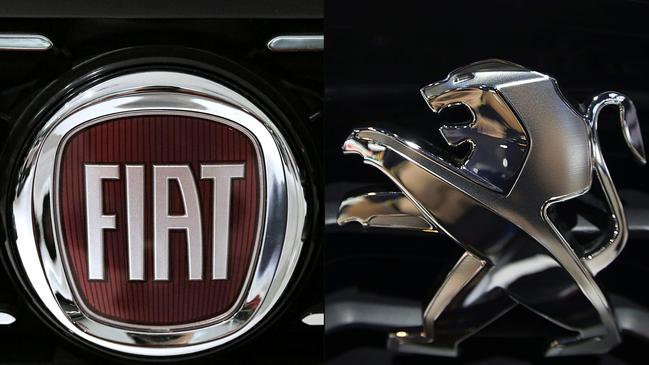
AFP




To join the conversation, please log in. Don't have an account? Register
Join the conversation, you are commenting as Logout